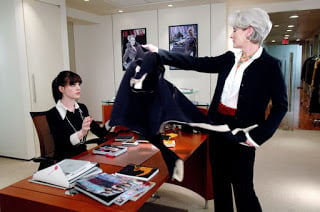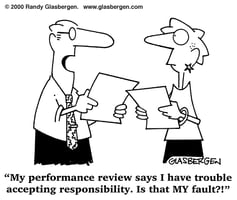Believe it or not, there are managers who care. Managers in the workplace who want to do a great...
The Boss
Managing people is a skill. Yes, there are attributes that come easier for some which allow them to manage easier, but the use and refinement of those attributes is what makes it right. The guilt some feel about not being a good manager is often a result of comparison to one of these “naturals.”
Are you a natural? Do you find yourself easily speaking with your team? Do you find that there is an ability to connect with people that just flows from you? That’s wonderful! But, it doesn’t mean that you’re managing people. It could mean that you are a great friend, a great listener, or a great motivator, but it doesn’t mean management is natural. Being the boss is meant to be categorized by effectiveness, best use of talent and profitability, to start, not merely being the "fun" manager.
Think about a boss you’ve had that you liked. Perhaps the reason you liked him/her is because of the great manner with which your department was led. You liked that he/she took the reigns, presented as a resource for the team and kept everyone focused on the mission. You like that. You crave good direction. You desire knowledgeable people to take seriously their role. Perhaps.
Or perhaps it was because you connected with him/her relationally. You had common interests. You shared a passion for sports, for a hobby or for beer (maybe beer is a hobby?). You got to know each other’s families. You shared time outside of work being social. Did that make the person a great manager? Or merely a great friend?
I am not suggesting that every manager become a Miranda Priestly and remain clearly unfriendly and distant. However, I am suggesting that swinging the pendulum too far the other way might make managing just as a difficult. Hone in the skill sets needed to manage effectively and use those skills as you rally your team together.
Time – There is a skill involved in planning and in the usage of time. If you are someone that just lets things “get away from you” then you aren’t managing. Time needs to be managed. Haven’t we all looked at the clock during the work day and thought, “How can it be 3PM? I haven’t gotten done what I needed to today.” Be competent in time management and help your team to pursue a similar goal. Efficiencies to process are certainly business-centric and are worth the effort.
Material Knowledge – What do we make, how do we make it, why do we make it. If it’s a service-related industry, follow the same pattern – what do we do, how do we do it, why do we do it. You’ve got to know this backward and forward, and be able to translate it well to your team. They will look to you to see how seriously they should know the answers to those questions. If it’s just a job for you, then don’t be surprised when it’s just the same for your team. Be passionate about the ingredients, materials, resources used to get done what you are tasked to get done.
Communication – “Hey, Bud, how ya doin’ today?” should not serve as the moniker of your relational investment. What does that communicate? Likely, you are a necessary person in my life and I can’t avoid it. Intentionality in communication is necessary. Plan what needs to be said; don’t hope you remember. Know what and why things have to be shared, the time it will take to do so and the opportunities for that communication to be collaborative.
Of course, there are more elements than this, but deciding to become proficient in these areas will certainly impact the team being managed. Once there is a mastery in skill development and process, then begin to attack the next step. It will become second nature.
 The effort matters. A manager who is deliberate in seeking to refine those skills or to develop new ones sets a stronger tone in his/her department right away. Your staff will recognize that you’re not there to be everyone’s best friend, but to be a developer of talent by taking seriously your own development. It also communicates a belief that not everyone is a “natural.” It’s okay to work at it. Think about the impact on the team you lead if they see you studying, practicing and exercising these skills. You will be encouraging them to do the same in their areas of functional responsibility and soft skill development.
The effort matters. A manager who is deliberate in seeking to refine those skills or to develop new ones sets a stronger tone in his/her department right away. Your staff will recognize that you’re not there to be everyone’s best friend, but to be a developer of talent by taking seriously your own development. It also communicates a belief that not everyone is a “natural.” It’s okay to work at it. Think about the impact on the team you lead if they see you studying, practicing and exercising these skills. You will be encouraging them to do the same in their areas of functional responsibility and soft skill development.
There were many days were I would have liked to do a “Devil-Wears-Prada-Throw-My Jacket-On-The-Head-Of-An-Employee” moment, but I didn’t. I had to make the decision that the proactive development of my management style would be compromised by either creating a too-friendly demeanor or a too-mean demeanor. So, hold onto your jacket as you walk in and hang it up yourself!
https://www.youtube.com/watch?v=1HnnWhANLjk



Blog comments